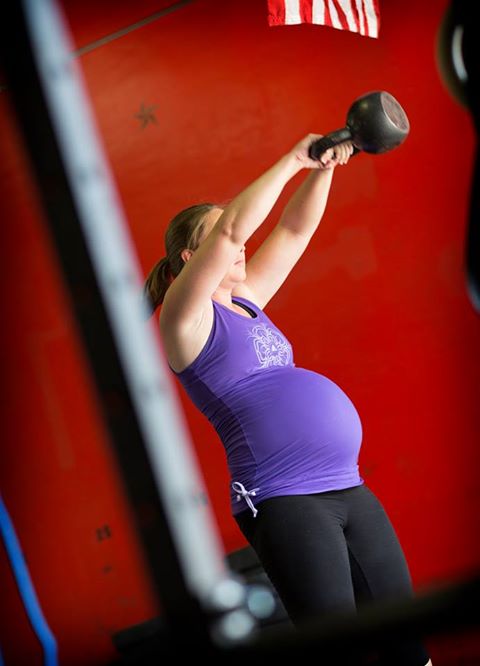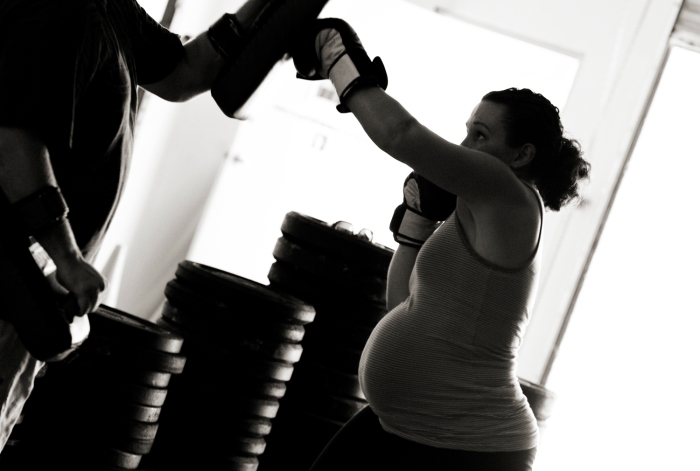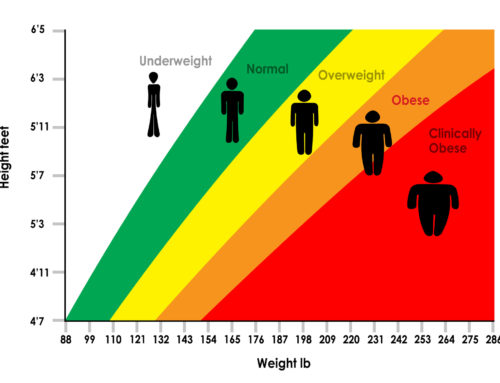Recently there have been several heated debates and articles on social media regarding exercise and pregnancy. These virtual “conversations” seem to be spurred on by the ever-increasing number of pictures of fit women who have chosen to continue to exercise through their pregnancies. Many observers and “concerned individuals” seem to think that extremely negative comments in a social media environment are a good way to “get these women in line” and “save their unborn children”. I have seen multiple comments in this vane. The problem is, provided a woman is under the watchful eye of a competent healthcare provider and is listening to her body, NO risks have been shown in any literature of which I am aware. So, these negative comments serve only to discourage women from being active (or at least from telling others about it and encouraging others).
Literature regarding exercise and pregnancy is HIGHLY in favor of exercise of ALL types (including moderate and high intensity in women conditioned for these types 5 as well as resistance training).17 It is also supportive of exercise program in ALL pregnant women, even those who were, prior to their pregnancy, sedentary. 11 That is not to say that a sedentary woman should take up an Olympic Lifting regimen, CrossFit program, or try to run a marathon when she finds out she is pregnant, but it does mean that she should INCREASE her efforts to be active and fit. The ACOG (American College of Obstetricians and Gynecologists) recommends greater than or equal to 30 minutes of moderate exercise on most if not all days of the week for ALL healthy pregnant women. Regarding intensity, they (the ACOG) state that increasing exercise intensity to greater than or equal to 60% of heart rate reserve during pregnancy reduces the risk of gestational diabetes mellitus and perhaps hypertensive disorders when compared to less intense exercise. 17,18 The FitFor2 Study, a randomized control trial, supports this statement.15 Finally, they also state that light muscle strengthening performed over the second and third trimester of pregnancy has minimal effects on a newborn infant’s body size and overall health.17 Most importantly, in my mind and likely in the mind of these women accused of endangering the lives of their unborn children, exercise helps them to feel better and therefore provide a better, safer environment for their child. This too is supported by literature. A randomized control trial from the Australian Physiotherapy Association reports women who exercised during pregnancy reported improved quality of life, and improved physical functioning as well as lower pain levels as compared to the control group.11 Multiple other studies support the positive role of exercise both psychologically and physically during pregnancy.1,3,4,5,6,7,8,9,10,11,13,14,15,16,17,18 None report adverse affects to mother or infant.
In general, as a healthcare provider, woman, and mother of three, I have found that pregnant women are more in-tune with their bodies than any other group of people. So, next time you see an article or picture, be supportive of women who chose to remain or become active during pregnancy instead of treating pregnancy like a disease or excuse to eat whatever they want and be waited-upon. Also, remember that women have been having babies for years-upon-years and did not always have access to the conveniences we do today. So, it is likely that women had to lift, walk, run, and perform many other physical tasks, and did so without a second thought (or negative comment from on lookers). Please encourage and applaud those who are choosing to attempt to give their children the BEST possible start in this world that is addicted to comfort, and convenience evidenced by the obesity epidemic in our country and across the civilized world. And if you chose not to applaud them, refrain from discouraging them out of ignorance to the scientific information that supports what they are doing for their own health and the health of their children.
Professionally,
Tina Neuwirth PT, DPT, OCS
Doctor of Physical Therapy (and exercising mother of 3)
Reference List:
1. Today in PT. “Blues Busters: PTs play a role in postpartum depression recovery, both in screening and treatment”. Wood, Debra. June, 11, 2012.
2. Postpartum Health for Moms: An Educational Package for Restoring Form & Function after Pregnancy. Lee, Diane et al. 2006.
3. Women’s Bodies, Women’s Wisdom: Creating Physical and Emotional Health and Healing. Northrup M.D., Christiane. Bantam Books, 2010.
4. “Urinary Incontinence, Pelvic Floor Dysfunction, Exercise and Sport”. Sports Med 2004; 34(7):451-464.
5. “Effects of Intense Training During and After Pregnancy in Top-Level Athletes”. Scandinavian Journal of Medicine & Science in Sports 2005; 15: 79-86.
6. “Randomised Controlled Trial of Pelvic Floor Muscle Training During Pregnancy”. BJM 2004; 329: 378-80.
7. “A Pilot Study on the Effectos of Aquatic Exercises on Discomforts of Pregnancy”. JOGNN; 2006; 35: 315-323.
8. “Exercises for Low Back Pain in Pregnancy”. International Journal of Childbirth Education 2008; 23(3): 9-12.
9. “Treatment of Pelvic Girdle Pain in Pregnant Women: Adverse Effects of Standard Treatment, Acupuncture and Stabilising Exercises on the Pregnancy, Mother, Delivery and The Fetus/Neonate”. BMC Complementary and Alternative Medicine 2008; 8:34.
10. “Unassisted Pelvic Floor Exercises for Postnatal Women: A Systematic Review”. JAN 2007. Blackwell Publishing Ltd.
11. “Aerobic Exercise During Pregnancy Improves Health-related Quality of Life: A Randomised trial”. Journal of Physiotherapy 2010; 6: 253-58.
12. “The Pregnant Athlete, Part 2: Exercise Recommendations”. Athletic Therapy Today 2010; 15(3): 38-41.
13. “Recovery of the Pelvic Floor After Pregnancy and Childbirth”. British Journal of Midwifery 2010; 18(1): 51-53.
14. “Postpartum Recovery After Vaginal Birth: The First 6 Weeks”. International Journal of Childbirth Education 2009; 24(3): 32-34.
15. “Design of FitFor2 Study: The Effects of an Exercise Program on Insulin Sensitivity and Plasma Glucose Levels in Pregnant Women at High Risk for Gestational Diabetes”. BMC Pregnancy and Childbirth 2009; 9(1).
16. “Stress Urinary Incontinence & The Pelvis”. 2011. Diane Lee.
17. “Exercise Guidelines in Pregnancy: New Perspectives”. Sports Med 2011: 41 (6); 245-360.
18. “Physical Activity in Pregnancy: Cardiovascular Adaptations, Recommendations and Pregnancy Outcomes”. Sports Med 2010; 40(6); 493-507.








My stepmother was pregnant with twins and taught aerobics all the way through her pregnancy, 28 years ago. None of the people who took her classes questioned if she was hurting the babies, for the last month she did teach the low impact classes. She went through labor without pain killers, and recovered to teach classes again four weeks after having them. She probably would have gone back sooner but was breast feeding and needed to be with the babies. Both the girls have grown up healthy and one is a mother herself now. I would say starting an intense exercise program without consulting a Dr when you are pregnant is not smart. At the same time I don’t know of one Dr who would say, sitting on your butt and eat potato chips and ice cream is better while you’re pregnant then exercising, most Drs would tell to continue what you are doing, just don’t overdo it.